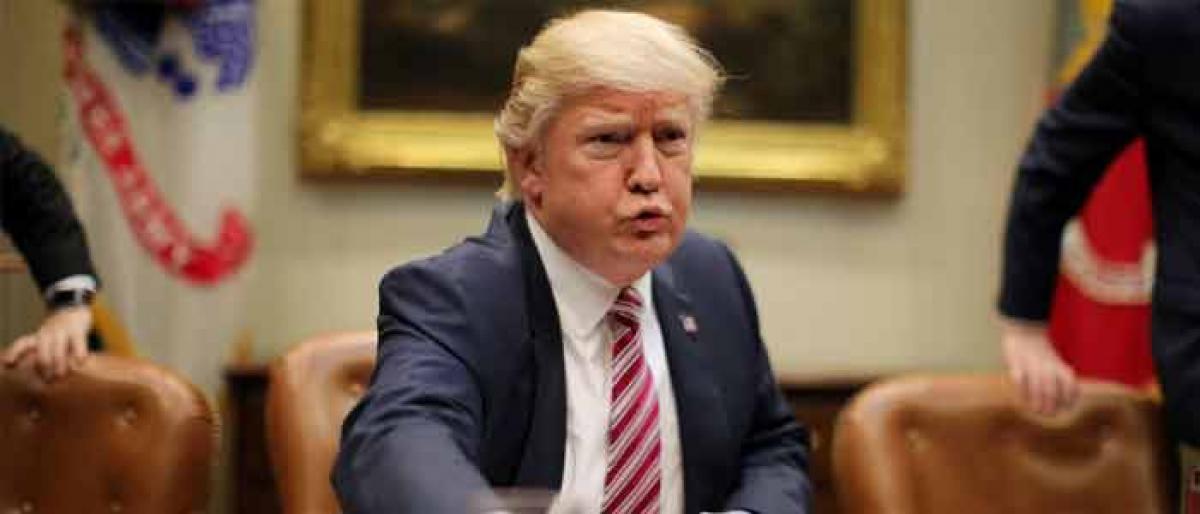Live
- ‘Fear’ movie review: A gripping suspense thriller
- Telangana IT Minister D. Sridhar Babu Highlights Future City Vision and Data Center Growth at IAMPHENOM Event
- Quota stir: Panchamasali seer violated law, claims Siddaramaiah
- India vs Australia: Third Test at Gabba – Match Timings and Details
- Allu Arjun’s team denies arrest rumors; gives clarity
- Film actor Mohan Babu knocks High Court doors. Requests for anticipatory bail
- Allu Arjun Seeks Lunch Motion; Court Hearing Scheduled for 2 PM Today
- Vijayawada hosts Swarnandhra Vision-2047 Program to foster development in AP
- World Bank okays loan for new project to boost earnings of UP farmers
- Zomato gets GST tax demand notice of Rs 803 crore
Just In

The Trump administration has announced a new policy that makes very tough the procedure of issuing H-1B visas to those to be employed at one or more third-party worksites, a move that will hugely impact Indian IT companies and their employees.
Washington: The Trump administration has announced a new policy that makes very tough the procedure of issuing H-1B visas to those to be employed at one or more third-party worksites, a move that will hugely impact Indian IT companies and their employees.
Under the new policy, the company would have to go an extra length to prove that its H1B employee at a third-party worksite has specific and non-qualifying speculative assignments in speciality occupation. The H1B programme offers temporary US visas that allow companies to hire highly skilled foreign professionals working in areas with shortages of qualified American workers.
Indian IT companies, which are among the major beneficiaries of H1B visas, has a significant number of its employees deployed at third-party worksites. A significant number of American banking, travel and commercial services depend on on-site IT workers from India to get their job done. The new move empowers the US Citizenship and Immigration Services (USCIS) to issue H1B visas to an employee only for the period for which he/she has work at a third-party worksite.
The latest policy memorandum is a part of President Donald Trump's 'Buy American and Hire American Executive Order' and the directive to protect the interests of US workers, the USCIS said. As such the issuing of H1B visas could be of less than three years. This would reverse the tradition of issuing the H1B visas for three years at a time.
Effective immediately, the new guidance comes weeks ahead of the beginning of the H1B visas filing season, which is expected to be April 2, for the fiscal year 2019 beginning October 1, 2018. The guidance says in order for an H1B petition involving a third-party worksite to be approved, the petitioner must show by a preponderance of evidence that the beneficiary will be employed in a speciality occupation and the employer will maintain an employer-employee relationship with the beneficiary for the duration of the requested validity period.
When H1B beneficiaries are placed at third-party worksites, the companies must demonstrate that they have specific and non-speculative qualifying assignments in a speciality occupation for that beneficiary for the entire time requested on the petition.
While an H1B petition may be approved for up to three years, the USCIS will, in its discretion, generally limit the approval period to the length of time demonstrated that the beneficiary will be placed in non-speculative work and during which the petitioner will maintain the requisite employer-employee relationship, an official statement said.
Extensions of H1B visas have become even tougher, in particular if the employee has been on a bench for any part of their previous duration. Sometimes American companies abruptly end the contract of an employee as a result the workers temporarily do not have any work, which in IT parlance is called on bench.
During this period, while they maintain their H1B visas status, official investigations have revealed that foreign IT workers on H1B visas do not get paid, which the USCIS says is illegal and abuse of the system. "If an H1B petitioner is applying to extend H1B employment for a beneficiary who was placed at one or more third-party worksites during the course of past employment with the same petitioner, that petitioner should also establish that the H-1B requirements have been met for the entire prior approval period," the USCIS said.
And if these conditions are not met, and if the petitioner did not comply with the terms and conditions of the original petition and did not file an amended petition on time, USCIS may have eligibility concerns about a subsequent petition filed to extend the beneficiary's employment, the policy memorandum said.

© 2024 Hyderabad Media House Limited/The Hans India. All rights reserved. Powered by hocalwire.com







